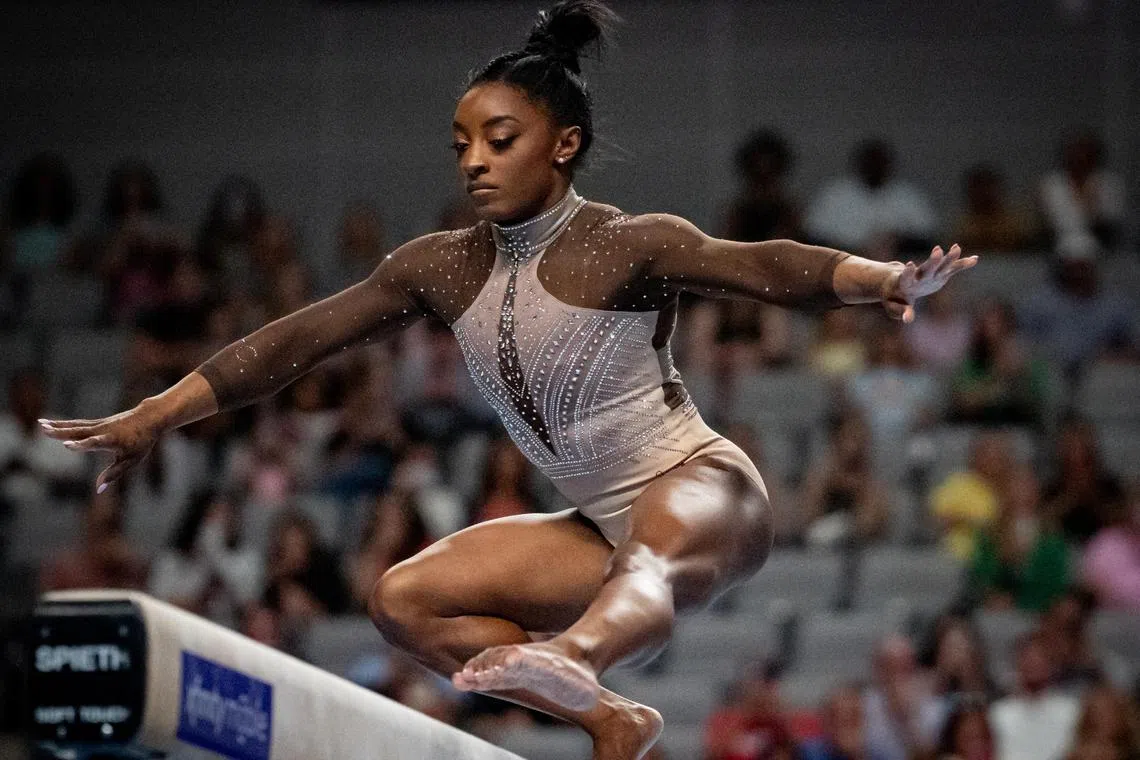Meditation and AI as Paris Olympics embraces ‘mindfulness’
Sign up now: Get the biggest sports news in your inbox

Thanks to gymnast Simone Biles, there is far greater awareness regarding athletes' mental health and better care and support available.
PHOTO: REUTERS
PARIS – Three years after gymnastics superstar Simone Biles put the mental health of athletes centre stage at the Tokyo Olympics, the Paris Games will demonstrate how greater awareness has translated into better care and support.
Biles famously pulled out of most of her events in Tokyo mid-Games after struggling with mental health issues and the “twisties” – a disorienting feeling while in mid-air that is known to affect some gymnasts.
In the run-up to the start of Paris 2024, local organisers, the International Olympic Committee (IOC) and international sports federations have been keen to stress that lessons have been learnt.
For the first time at an Olympics, competitors will have access to a “mindfulness and relaxation area” above the main gym in the Athletes’ Village, called the “Athlete365 Mind Zone”.
They will be offered virtual reality headsets for meditation, sleep pods, and even art activities, all in a low-lighting environment designed to be soothing and quiet.
“It’ll be very zen, like a futuristic spa,” said Kirsty Burrows, head of safe sport at the IOC.
Also in the Village, athletes will have an alcohol-free bar and social areas to help them kick back, as well as guides on how to maintain good mental hygiene by avoiding too much time on screens.
“In the same way that no athlete would think of stuffing themselves with burgers and sweets before a competition, it’s not good to stuff yourself with videos on social networks by binge-watching TikTok or Instagram,” said Paris 2024 health coordinator Laurent Dalard.
A mental health helpline in 70 languages will also be available to all Olympic and Paralympic athletes.
Around 90 nations will bring their own mental health welfare officers, using a new type of Games accreditation which has only been available since the Beijing Winter Olympics in 2022, Burrows added.
Research suggests that elite sports people suffer from mental health disorders in around the same proportions as the general population, experts say.
But Dalard stressed that they were “more vulnerable to situations such as anxiety disorders or depression, given their complicated lives and the intense pressure they face”.
According to psychiatrist Marion Leboyer, “around one athlete in three has symptoms of a mental health issue”.
Long a taboo subject, many of them are now opening up about their struggles thanks to the revelations of stars such as Biles, Japanese tennis player Naomi Osaka and Australian swimmer Ian Thorpe.
Paris 2024 will also see efforts to counter cyber-harassment and bullying taken to new AI-powered levels.
“I’m really pleased about the cybersecurity stuff around social media and athletes being trolled,” said Alan Currie, a psychiatrist who advises the IOC. “That’s a huge step forward because that’s a real pressure point for athletes.”
Following the example of global football governing body Fifa, World Rugby and some English Premier League football clubs, the IOC will team up with London-based data company Signify.ai to weed out abusive posts among the billions expected during the Games.
Signify uses artificial intelligence to monitor messages addressed to athletes on platforms such as Facebook, TikTok or X in 35 languages, flagging potential harassment or threats.
“Anything that breaches the criminal code will be sent to law enforcement,” Burrows said.
All 15,000 athletes at the Olympics and Paralympics will be offered the service, which will be on an opt-in basis. AFP


